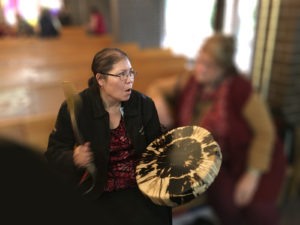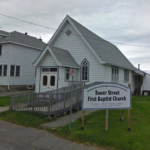 O Canada.
O Canada.
We’re the good guys, right? 150 years of being noble peacemakers and upstanding global citizens. But before we lapse into too much self-congratulation, we must acknowledge our shameful track record with our indigenous peoples. Over our colonial history, we have inflicted disease, violence, and discrimination. We have taken their children, ignored their missing and murdered women, and attempted to erase their cultures. For a nation that prides itself on kindness and tolerance, we have a lot to answer for.
And yet, there are few better examples of Christ-like forgiveness anywhere than in Canada’s indigenous peoples. Rather than hitting back, they are working through truth and reconciliation; seeking ways to build new bridges, rather than leave the gap wide.
Some of the churches in our family have felt God’s stirring to respond to Canada’s First Nations: to learn, walk in partnership and, essentially, start from the beginning to establish right relationships. Highland Baptist Church in Kitchener is one example. In October, they hosted a conference called “Resetting the Relationship.” While we can’t undo the mistakes of our national past, the conference recognized that Canada and the Church need a do-over when it comes to its indigenous populations. We are blessed that they are willing to give us the opportunity.
One of the guests in attendance was Chief Marcia Martel of Beaverhouse First Nation. Approachable and unassuming, Chief Martel wears her leadership humbly. She is one of those rare leaders who can command respect without seeking the spotlight. Over an Ethiopian meal near the conference, Marcia shared some of her story and her connection with Canadian Baptists.
Marcia was one of the children caught up in the 60s Scoop. She was born into a family living on a reserve on Misema Lake near the Quebec-Ontario border in remote northern Ontario, seemingly far from the reaches of colonial culture. But there came a day while she was little when armed police showed up, stole the children and took them to new homes for their “cultural education.”
Some children were placed in misinformed but well-meaning foster family. Marcia was not. Rather, she was placed with a series of horrible foster families. “I suffered abuses. The multi- and many variety of abuses there are,” says Marcia. “People didn’t know how bad it could get. So there’s almost an incredulity to it. Canada doesn’t do this to its children…but the reality is that this happened in Canada to thousands upon thousands upon thousands.”
As part of the 60s Scoop, nearly 20,000 indigenous children were taught to disregard their own culture, language and identity. In an environment that lacked any semblance of accountability, vulnerable children were subjected to the worst kinds of abuse. “People saw a social worker several times with no results. Abuses were tolerated, and I say tolerated because as much as one can say that Canada’s desire [was] to have their doors open with love and compassion…it allowed for others to open their doors with ill intent.”
Sadly, there seems to have been no shortage of ill-intentioned people. And even with sporadic visits from social workers, how can a child open up about abuse if they’re not going to be removed from the home immediately? When a child has to eat dinner with a monster every night, the last thing he or she wants to do is make it angry.
Even once she was out from under her foster parents’ care, life wasn’t easy for Marcia. “If you do not believe you are worthy of people who will treat you nicely and only have skills for dealing with people who treat you badly, those are the people you end up with,” says Marcia. Suicidal thoughts were a daily reality for her, yet she soldiered on. But then something happened: Marcia had a son and, as children are wont to do, he changed everything.
She had never wanted children, and no wonder, given her experience of childhood. But having a child led Marcia to ask some difficult questions. She knew of the risks of abused parents becoming abusers, but Marcia was determined to do things differently. She wanted her son to know every day of his life that he was loved. He was cherished.
By some miracle, faith had always been a part of Marcia’s reality. She knew that God was real. “I was told about God when I was little. I believed people—I was little. By the time I reached the age of questioning, I’d seen too many things to question it. I’d experienced too many things to know that it wasn’t a lie. He didn’t spare me from the abuse over the years…as many times as you say, ‘God, please don’t let these people hurt me.’ But these people have free will.” Despite it all, Marcia believed in God’s mercy and love.
By the time her son was two, in 1993, Marcia knew it was time to make a choice. “I gave the guidance of my life over to God; I trusted my very eternity with the Creator.”
 As her son grew, Marcia realized that they would need to be part of a church—a community of people to worship and grow with. But where does an indigenous single mother fit in? Certainly not in all churches, where some parents kept their children away from her son. When she found Tower Street Baptist Church in Kirkland Lake, it was the right fit. They were welcoming without being overwhelming. But there was a learning curve there too. A lack of understanding led to periodic concerns from some people about indigenous traditions, but Marcia is truly an ambassador for her culture and people. She has a wry sense of humour that carries her through, and enough grace to be patient with “stupid” questions.
As her son grew, Marcia realized that they would need to be part of a church—a community of people to worship and grow with. But where does an indigenous single mother fit in? Certainly not in all churches, where some parents kept their children away from her son. When she found Tower Street Baptist Church in Kirkland Lake, it was the right fit. They were welcoming without being overwhelming. But there was a learning curve there too. A lack of understanding led to periodic concerns from some people about indigenous traditions, but Marcia is truly an ambassador for her culture and people. She has a wry sense of humour that carries her through, and enough grace to be patient with “stupid” questions.
Now Marcia is the Chief of the Beaverhouse First Nation, and has been integrated in to her community as a spiritual and cultural leader. Grandmother to many, she sits with the elders. “I’ve lost family, friends and community. I’ve lost the things that tied people together in communities. Yet I was able to somehow have that life in my community come back to me in a bundle.”
Now Marcia is leading the legal case against the government in the 60s Scoop, a case that forces all of us Canadians to acknowledge the national sins of our past and seek the opportunity to start again on a foundation built on mutual respect. There is hope of reconciliation. There is a chance to reset this relationship and learn from each other.
We still have a long way to go, but God is moving in our family of churches. There are exciting points of connection and opportunities to reach out: the New Paths conference at Lorne Park Baptist Church, Mississauga, a few years ago; another in Thunder Bay; Resetting the Relationship at Highland Baptist Church; plus the many smaller connections and missional initiatives that fly under our radar. We sense that God is moving among us as Canadian Baptists respond to God’s call for reconciliation.
“If you have the ability to help guide how to change this world to a better place, then step up. It’s everyday common people that make those changes…that step up to those challenges for what needs to happen in this world…I thought the commonality of the 60s Scoop was pain, but there’s something greater—love. Love for our community, for ourselves, and that is far stronger than any pain,” says Marcia.
The road to reconciliation is a long one, but we are headed in the right direction. As we build our relationships with our indigenous neighbours, and those within our church families, we have enormous opportunities for mutual learning and growth.
To read more stories from the Canadian Baptist family in Ontario and Quebec, check out The Canadian Baptist magazine!
